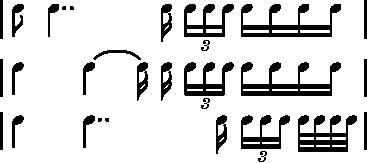



A includes erroneous rhythmic values here:

Adopting a natural assumption that the slur and beam of the 4th, 5th and 6th notes of the bar designate a semiquaver triplet, we state that the bar includes 9 quavers. Chopin's mistake (stemming probably from corrections of A) may be theoretically found in the notation of the 1st, 2nd or last crotchet of the bar:

The way in which the part of the R.H. is placed in A with respect to the quavers in the L.H. clearly indicates the second of the given schemes to be corresponding to Chopin's intention, hence we adopt this version as the text of A and the main text.
In GE (→FE→EE1→EE2) the erroneous rhythmic values of A were repeated without any changes. However, they were placed in such a way that 8 semiquavers equally fill the 2nd half of the bar. Taking into account the fact that 4 semiquavers falling on the 3rd beat are embraced in these editions with one slur, we consider the text of GE2 to be the most likely interpretation manner of such written version, in which the dots extending a 2 on the 2nd beat of the bar were removed. However, such an interpretation is certainly erroneous, since the authentic extending dots indicate, together with the accent, a clear syncopation nature of this note.
2 on the 2nd beat of the bar were removed. However, such an interpretation is certainly erroneous, since the authentic extending dots indicate, together with the accent, a clear syncopation nature of this note.
In EE3 the group of three semiquavers on the 3rd beat of the bar was marked as a triplet, which did not remove the erroneous excess of the rhythmic values, but it practically brought the rhythm to the one adopted in the main text.
Compare the passage in the sources »
category imprint: Interpretations within context; Differences between sources
issues: EE revisions, GE revisions, Rhythmic errors, Errors of A
notation: Rhythm


